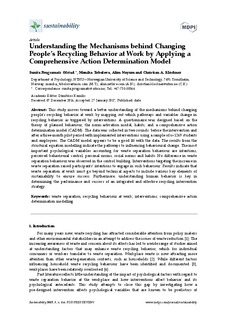| dc.contributor.author | Ofstad, Sunita P. | |
| dc.contributor.author | Monika, Tobolova | |
| dc.contributor.author | Alim, Nayum | |
| dc.contributor.author | Christian A., Klockner | |
| dc.date.accessioned | 2017-03-16T11:41:00Z | |
| dc.date.available | 2017-03-16T11:41:00Z | |
| dc.date.created | 2017-03-09T15:35:30Z | |
| dc.date.issued | 2017 | |
| dc.identifier.issn | 2071-1050 | |
| dc.identifier.uri | http://hdl.handle.net/11250/2434339 | |
| dc.description.abstract | This study moves toward a better understanding of the mechanisms behind changingpeople’s recycling behavior at work by mapping out which pathways and variables changein recycling behavior as triggered by interventions. A questionnaire was designed based onthe theory of planned behaviour, the norm-activation model, habits, and a comprehensive actiondetermination model (CADM). The data was collected in two rounds: before the interventionand after a three-month pilot period with implemented interventions using a sample ofn =1269students and employees. The CADM model appears to be a good fit with the data. The resultsfrom the structural equation modelling indicate the pathways to influencing behavioural change.The most important psychological variables accounting for waste separation behaviour are intentions,perceived behavioural control, personal norms, social norms and habits. No difference in wasteseparation behaviour was observed in the control building. Interventions targeting the increasein waste separation raised participants’ intentions to engage in such behaviour. Results indicatethat waste separation at work must go beyond technical aspects to include various key elements ofsustainability to ensure success. Furthermore, understanding human behavior is key in determiningthe performance and success of an integrated and effective recycling intervention strategy. | nb_NO |
| dc.language.iso | eng | nb_NO |
| dc.publisher | MDPI | nb_NO |
| dc.rights | Navngivelse 4.0 Internasjonal | * |
| dc.rights.uri | http://creativecommons.org/licenses/by/4.0/deed.no | * |
| dc.title | Understanding the mechanisms behind changing people’s recycling behavior at work by applying a comprehensive action determination model | nb_NO |
| dc.type | Journal article | nb_NO |
| dc.type | Peer reviewed | nb_NO |
| dc.source.journal | Sustainability | nb_NO |
| dc.identifier.doi | 10.3390/su9020204 | |
| dc.identifier.cristin | 1457007 | |
| dc.description.localcode | ©2017 by the authors; licensee MDPI, Basel, Switzerland. This article is an open accessarticle distributed under the terms and conditions of the Creative Commons Attribution(CC BY) license (http://creativecommons.org/licenses/by/4.0/). | nb_NO |
| cristin.unitcode | 194,67,40,0 | |
| cristin.unitname | Psykologisk institutt | |
| cristin.ispublished | true | |
| cristin.fulltext | original | |
| cristin.qualitycode | 1 | |

